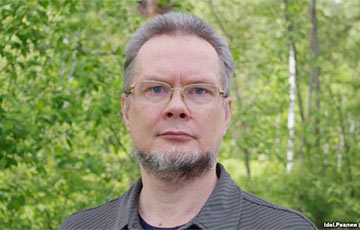Andrei Ozharovsky: Reaction of Belarusian Nuclear Scientists Raises Many Questions
11- 20.12.2023, 15:24
- 22,792

What actually happened at the BelNPP?
The Bloomberg news agency, citing internal Rosatom documents, reported that in February 2022, a serious problem was discovered at the BelNPP – ion exchange resin was leaking into the first circuit of the second power unit, threatening to damage and stop critical parts.
How serious is this threat? The journalists of Charter97.org asked nuclear scientist Andrei Ozharovsky about this:
– Bloomberg wrote about an incident that happened a long time ago, before launching the second power unit of the Belarusian Nuclear Power Plant (BelNPP) into operation. A strange thing happened then. Belarusian nuclear scientists promised that the unit would be launched in the spring of 2022. This did not happen. There was a delay of about a year. The power unit was launched only in 2023 and no one understood what went wrong.
Then there was a message in the media from employees of the nuclear power plant, who also addressed environmental activists, and then a message from Lithuanian intelligence appeared that the reason for the launching delay of the already built power unit was resin contamination of the first circuit.
We can say that Bloomberg verified this. Bloomberg is a major international news agency and, mind you, they refer not to Lithuanian intelligence, not to the data of the workers of the nuclear plant itself, but to Rosatom papers that they were able to obtain.
So, we are not talking about something new, but about confirmation of what everyone wrote about a year ago when they were waiting: whether the power unit would be launched in the spring of 2022 or not. I’d like to repeat that it was not launched.
What did Bloomberg find out?
The important thing is that the publication indicated that these are ion exchange resins. It’s part of the system for maintaining the complete purity of the water at the first circuit.
– What is the danger of the presence of foreign substances in the first circuit?
– That’s an emergency, of course. The affected unit cannot operate in this case. This is, first of all, because the heat exchange between nuclear fuel and the very rods that contain the uranium fuel and water, which should carry away the heat, is disrupted.
If heat exchange is disrupted, then conditions for partial melting of the fuel or, at least, loss of tightness of the fuel elements may arise. That’s very bad, of course.
By the way, it’s good that Bloomberg intervened in the situation since there was an issue. I’m talking about the reaction of Russian and Belarusian nuclear scientists, then and now. They deny everything, saying, “You’re all lying.” It raises more questions for them than answers.
– What do you think should be done? Shall the IAEA intervene? Is the admission of international specialists needed?
– Since both Russian and Belarusian nuclear scientists chose the tactic of denying everything, and I will remind you that Peskov spoke about “slander,” it seems to me that dialogue with them is impossible in the current situation.
Neither the IAEA nor other international organizations will help. The Bloomberg article, by the way, indicates that Bloomberg requested not the IAEA, but the WANO (World Association of Nuclear Operators). This is a club of nuclear operators who like to do “mutual checks.” They come from one nuclear power plant to another and tell everyone that everything is fine there. These organizations are totally useless when everything is bad.
Unfortunately, Rosatom is the one master of the BelNPP. They have built a system in which they take advantage of secrecy and lack of public control.
The Belarusian authorities threw environmental organizations out of the country. The Ecodom, which actively participated in establishing a dialogue with these nuclear scientists, was recognized as an “extremist formation”.
The Belarusian authorities have clearly shown that they are not interested in either dialogue or public control at all. The case with Bloomberg confirms this. But if you can somehow humiliate your public, put them on shameful lists and discriminate, then this will not work with journalists from international publications.
I think that Bloomberg will have more investigations into how Rosatom got into trouble at the Belarusian Nuclear Power Plant. We just have to wait.











